UPDATE | 2019年01月09日
日本で留学生を受け入れている高等教育機関の種類は全部で7つ。教育目標や卒業後の進路も学校によりさまざまです。あなたが進学したい校種をここで確認しましょう。
外国人留学生を受け入れている日本の高等教育機関には、「大学院」「大学」「短期大学」「専門職大学」「専門職短期大学」「専門学校」「高等専門学校」の7種類があります。いずれの学校も在留資格「留学」が取得できる学校です。それぞれ取得できる学位や修業年限、入学資格、特色、かかる費用が異なるので、自分の目的に合った学校を選びましょう。
目次

日本の高等教育は、6年間の初等教育および前期3年間、後期3年間の中等教育を合わせた12年間を修了してから始まります。
日本において高等教育機関に分類される学校は、「大学院」「大学」「短期大学」「専門学校」「高等専門学校」、そして、2019年度より新しく設置される「専門職大学」「専門職短期大学」の7つです。校種により異なりますが、国が設置する「国立」、地方公共団体が設置する「公立」、その他学校法人や株式会社などが設置する「私立」の学校があります。日本の場合、その多くが私立の学校です。
国立、公立と私立の学校の違いのひとつに「費用」があります。
入学金や授業料など進学にかかる費用が、国立と公立の学校の場合は国などが定めた基準値があるため、比較的安く設定されていますが、私立の学校の場合は、入学する学校や学ぶ分野により大きく異なります。
そのため、一見私立の学校はとても費用がかかるように見えますが、多くの学校では奨学金をはじめ、学費の免除や減免制度など費用をサポートする制度が用意されているので、行きたい学校が決まったら、奨学金などのサポート制度も調べてみましょう。
高等教育機関に限らず、日本の教育機関のほとんどが4月~翌年3月までの1年間で1学年としています。そのため、入学試験は9月頃から始まります。
試験方法は、大学の一部で共通試験を実施する場合もありますが、筆記試験や面接試験などの学校独自の試験が主です。試験内容や科目は学校により異なるので、志望校が決まったらその学校の受験科目や内容を調べてみましょう。
日本の高等教育機関で特徴的なのは、出願の段階で学ぶ専攻を決めておく必要があることです。
入学後に専攻を変更することが可能な学校もありますが、変更できる専攻に限りがあったり、変更する場合も改めて試験などが実施されることがほとんどです。
どの学校へ進学するとしても、入学前の学校調べがとても重要になってきますので、インターネットや進学説明会などを利用して、自分が学びたいことはどの学校に行けばできるのか、時間をかけてじっくりと調べてみましょう。
[PR]
大学の学部(学士課程)の上、または独立して設置される研究機関で、国立、公立、私立の学校があります。
日本の大学院制度で特徴的なのは、多くの学校で「博士課程」が前期課程と後期課程の2つに分かれているところです。博士課程(前期課程)のみで修了した場合、修士課程と同等と見なされます。
入学の基準は、学校ごとに異なりますが、「修士課程」「博士課程(前期)」「専門職学位課程」は大学卒業(学士取得)相当、「博士課程(後期)」は、博士課程(前期)または修士課程修了相当の学力が求められます。
「修士課程」「博士課程」と、高度な専門職業人材の養成を目指す「専門職学位課程(修士課程)」の3つの過程があり、それぞれの修業年限は、修士課程で2年間、専門職学位課程で2年~3年間、博士課程で3年間が一般的です。
国立、公立、私立の学校があり、その多くが私立の大学です。
正規過程の修業年限は4年間、専門的国家資格等を取得することが目的となる医学、歯学、獣医学、一部の薬学などは6年間となっています。
いずれも、修業年限や単位数などの条件を満たして卒業をすると、「学士」の学位が与えられます。
一部の学校では、大学院や大学への進学を希望する外国人の学生を対象に、日本語教育などを行う準備機関である「留学生別科(日本語別科)」を設置しています。英語のみで卒業できる大学や学部・学科もありますが、日本の大学の場合、日本語での授業が多いため日本語能力に不安のある人は、留学生別科の利用も検討してみましょう。
修学年数や年齢などの細かな条件がありますが、主には高等学校修了相当の力を有することが入学の条件です。
>「大学」について詳しく調べる公立、私立の学校があり、ほとんどが私立の短期大学です。現在は、国立の短期大学はありません。
大学と比較すると修業年限が2年または3年間と短いほか、学術的な研究よりも社会に出て役立つ技術や知識を身につける教育に重点を置いており、専門的な職業人材の養成や、地域コミュニティの基盤となる人材の養成、教養的要素を有する人材の養成、生涯学習の場を目指す教育機関となっています。
修業年限や単位数などの条件を満たして卒業をすると、「短期大学士」の学位が与えれ、短期大学士は大学の途中年次に入学をすることができる編入学をすることができます。また、大学と同様に附属の「留学生別科(日本語別科)」がある学校もあります。
2019年度より新設される日本の新しい高等教育機関で、すべて私立の学校です。
大学で学ぶような高い学術的素養・教養とともに、専門学校で身につけるような社会で実践できる技術・能力を持つ人材育成を目指した教育を行います。
修業年限は、専門職大学で4年間、専門職短期大学で2年または3年間。卒業単位のうち3割~4割を企業などで実習を行います。修了後は大学、短期大学と同等の「学士(専門職)」「短期大学士(専門職)」の学位を得ることができます。
正式には、専修学校(専門課程)と呼ばれる、高等教育機関で、将来的な職業や資格取得のための専門的知識や技術を修得することを目的としています。国立、公立、私立の学校がありますが、ほとんどが私立の学校です。修業年限は2年間が主流ですが、専門性の高い分野については3年または4年間の学校もあります。
専門学校は、目指す職業や身につけたい技術によって、さまざまな学校や学科、コースがあることが特徴です。
大きく分けると「工業」「農業」「医療」「衛星」「教育・社会福祉」「商業実務」「服飾・家政」「文化・教養」の8つの分野があります。
修業年限や修了認定などの条件を満たして、文部科学大臣が認めた学科を卒業をすると、「専門士」または「高度専門士」の称号が与えられ、専門士には日本の大学への編入、高度専門士には日本の大学院への入学資格が与えられる学科もあります。
卒業後は、取得した技術本で学び日本で働きたいのか長期的な視野を持って学校を選ぶことが望ましいです。
>「専門学校」について詳しく調べる中等教育(後期)を含む修業年限5年間(商船学科のみ5年6ヶ月)の高等教育機関で、高度な技術を持つ技術者の養成を目的としています。国立、公立、私立の学校があり、多くは国立の学校です。
外国人留学生の場合は、1年次からの入学ではなく、高校卒業程度の学力を必要とする4年次または3年次への編入学での入学となります。
卒業をすると「準学士」の学位が取得でき、大学の3年次に編入学することができます(2年間の専攻科へ進学した場合は、大学院修士課程・博士課程前期への入学資格が得られます)。
さまざまな種類の学校があるので、自分の持っている学力や将来やりたいことにあった学校選びをするようにしましょう。
■この記事を読んだ人におすすめ

アクセス日本留学 編集部。外国人留学生のみなさんが日本の学校を見つけるための資料請求ができるWebサイト「アクセス日本留学」の運営や「外国人留学生のための進学説明会」を開催しています。
[PR]
[PR]